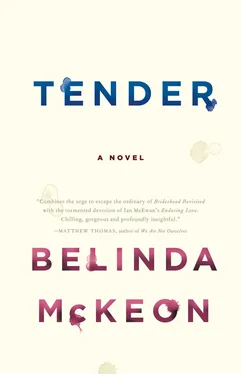Nobody was looking directly at him; that was what Catherine first noticed. He drew with charcoal, in strokes which were careful, which seemed to leave nothing to chance, going after detail — the ring on a finger, the rib of a cuff, the hard skin on an elbow — as though it was something threatened, something which had to be caught and preserved. And yet, for all his obedience to detail, it was the expressions — not just the faces, but the moods and preoccupations traveling through those faces, running under their surfaces like hidden streams — which came up out of the pages torn from a sketchbook and which set going in Catherine an anxiety which she could not understand.
“Nobody knows,” she said then, surprising herself; she had said it before consciously realizing it. “Nobody knows he’s drawing them.”
Beside her, Amy nodded. “That’s what he does. He catches people unawares.”
“He’s a little stalker,” Lorraine said. “A little paparazzi fucker.”
“See this one of Lorraine,” Amy said, and Lorraine gave a protesting wail.
“I have a double chin!”
“No, no, it’s you,” Catherine said, taking the drawing. “I mean, you, except with a double chin.”
“He’s a sneaky little bastard,” Lorraine said, reaching for her cigarettes. “He did not have my permission to do that.”
Catherine looked at Amy. “Has he done you?”
She nodded. “Somewhere in there. It was while we were in Irish class last year.”
“She was staring out the window deciding whether or not to give a hand job to Robbie Fox,” Lorraine said.
“Shut up, you,” said Amy, laughing. She went through the drawings more quickly now, lifting them up at the right-hand corner, separating them carefully; about fifteen or so in, she stopped. “Here I am,” she said, pulling the page out slowly.
“It’s lovely,” Catherine said quietly.
“Lovely for Robbie,” Lorraine snorted.
“No, really,” Catherine said, above their laughter. She leaned in to look more closely. It was Amy, in a school jumper, with a tie loosely knotted beneath a shirt collar, sitting with her knuckles pressed to her chin. Lorraine had remembered correctly: she was looking out a window. James had drawn the wooden frame, and an outline of the buildings outside, and he had drawn the small hoop in Amy’s right earlobe, and the biro in her hand. As with the other portraits, he had caught something in the eyes, and something about the mouth, which brought on a feeling of — Catherine could only think of it as worry, a kind of unease. Even though this Amy in charcoal, her attention on something outside or on something deep within her mind; even though she looked beautiful, soft-eyed — even for all this, there was something about the portrait that made Catherine feel that it was somehow wrong to be looking at it. Then it struck her: how direct the angle was. James would have needed to have been sitting almost right in front of Amy, only slightly to her right, to capture her like this; he would have needed to have been two desks or so in front of her, and turned fully around.
“How did you not see him?” she said to Amy, and Amy just shrugged.
“That’s the thing about the way he does them. He has some way of not letting anyone notice him. I don’t know how he manages.”
But on the morning James came back to Dublin, Catherine had quite forgotten about him — or rather, Catherine was too preoccupied with other matters to remember that he was coming. The other matters related to the night before, which had ended on Grafton Street not long before dawn, with Conor taking hold of her shoulders and telling her that she was a great chick, a great chick, over and over, while still, so enragingly, failing to actually put his arms around her and hold her, which by that time she had wanted so badly, for so long, that she felt as though she might just vaporize, standing there in front of him, with his useless fingers on her useless skin, or that she might instead just knee him in the balls, which was what she had done, come to think of it — she could hear again Amy’s voice saying, Oh Jesus, Catherine —but not even that successfully, because Conor had stood upright far too quickly afterwards, and he had been pleased, she could see, and now he was gone home to Wexford for the summer, to work in his uncle’s pub, and it would be October before she would see him again. About this, she felt miserable, but also relieved: there would be no more of his snideness, no more of his mockery, no more of his moods. She could recall asking him, before they left the Pav for the club — she had not stayed away from him after Amy’s lecture in the bathroom, or had managed to do so for only about twenty minutes — for advice on her situation, or indeed non-situation, with her summer job at the Longford Leader: since January, she had been meaning to phone the editor and remind him that he had told her, the summer before, to come back when she was in college. But she had not phoned him, for various reasons.
“One reason, Citóg,” Conor had said, when she told him. “One reason. Visceral fear.”
“I’m not afraid of him,” Catherine had said, delighted, as usual, to hear Conor referring to her with the nickname he had given her. It made no sense; it was the Irish word for left-handed people, and she was right-handed. But she loved it, anyway, and she tingled every time he said it. “How could I be afraid of him when I don’t even know him?”
“Right. Because that’s really stopped you being afraid of people before.”
“Fuck off .”
Then Conor had dragged someone else into the conversation, had humiliated her in front of someone who was a virtual stranger: Emmet Doyle, a quiet Dublin guy who Catherine knew vaguely from editorial meetings for Trinity News . He wrote mostly about dull student union politics, and he dressed in a slightly odd combination of smart shirts and scruffy cords, and his hair fell in soft brown curls around his face, and he blushed whenever anyone spoke to him. The blushing ought to have endeared him to Catherine, who suffered from precisely the same affliction, but instead it irritated her. She wanted men to have faces which showed not a flicker of what was going on in their minds. But now here was Emmet Doyle, blushing, and looking a little bewildered, while Conor outlined to him the farce of Catherine’s inability to call the Leader editor, and while Catherine yanked at Conor’s arm, and shoved him, and told him to stop making such a big deal out of it, Emmet proceeded, in his nice, polite, South County Dublin sentences, to suggest ways for Catherine to approach the task — what she should say to the editor; how she should make her case.
“I mean, just tell him you have, like, experience, and that you’ve done news, and that you’ve done layout, and that you’ve done different kinds of features and stuff. I mean, you’ve done stuff for TN, haven’t you? I’ve seen your name.”
She shrugged. “A few—”
“Tell him you got the last interview with Jeff Buckley,” Conor cut in.
“Jeff who?”
“Oh, for Christ’s sake, Citóg,” Conor said, putting his hand to his face, and it went on like that, a catalogue of mortification and stupidity, until daylight was hitting the red stones of Grafton Street, and until there was nothing else for it but to go home.
The next morning: a thumping skull, trembling skin, a stomach like seasickness. Amy and Lorraine were at the exam halls, with hangovers of their own for which, they made clear as they were leaving, they held Catherine entirely responsible, and a bag of peas from the freezer was the best thing she could find in the way of relief; she took it back to bed and fell asleep a second time with its coldness pressed above one ear. That sleep was a sinkhole of utter oblivion, in which dreams were out of the question because her body had a great deal of work to do, and when her eyes opened two hours later, what she noticed firstly was that the pain was gone, and secondly, that the noise from the street outside was much louder than it ought to have been, and thirdly, that it was not actually the noise from the streets, but the noise of someone in the sitting room, someone moving around, lifting things and putting them down. Sitting now, they were: the creak of the leather armchair. One of the girls, Catherine thought. Home to kill her for having kept them out until six o’clock in the morning.
Читать дальше












